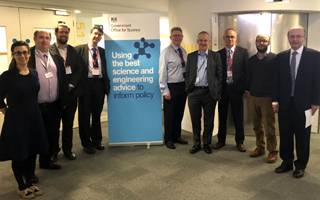Scientists spend a week at Westminster
6th December 2016
Two scientists from Norwich Research Park have taken part in a Royal Society scheme to bring the worlds of politics and science closer together.
The initiative, run by the Royal Society – the UK’s national academy of science – with support from the Government Office for Science, enabled them to spend a week at Westminster to develop a stronger understanding of how scientific findings can inform policymaking.
Dr Andrew Watson is a research scientist in the Analytical Sciences Unit at the Quadram Institute. Most recently he has been working on new ways of combatting food fraud. He presented this work to the Government Office for Science, the office that supports the Chief Scientific Advisor to the Government, as well as meeting civil servants, and spending time with the staff of Norman Lamb, Lib Dem MP for North Norfolk and Spokesman for Health.
Geoff Mok, a senior post-doctoral research associate from the University of East Anglia’s (UEA) School of Biological Sciences was partnered with Clive Lewis, Labour MP for Norwich South and Shadow Secretary of State for Business, Energy and Industrial Strategy.
For me one of significant points was to see how evidence forms only part of the picture when it comes to decision making – Dr Andrew Watson
“From a scientist’s perspective it’s easy, even natural, to think of ‘the evidence’ as the only thing that matters. But there’s more. Reliable evidence is key, but what actually happens sits in the overlap between the evidence, what’s actually possible, and what is politically sensible. It means that a decision maker can say ‘we know your evidence is sound but we will do different anyway’. That’s tough, but it was the same consistent message from the chief scientific advisor, Sir Mark Walport, and from Stephen Metcalfe MP, who chairs the House of Commons Science and Technology Committee,” said Andrew
At a reception to launch the week, Prof Brian Cox, CBE, FRS, spoke of the importance of policymakers and researchers working together to ensure the UK’s excellent science is used to improve people’s lives and tackle global challenges. The pairing scheme is in its sixteenth year and, this year, 34 scientists from a wide range of disciplines and universities and institutions all over the country took part by shadowing an MP or civil servant, who will in turn visit their partner scientist in the coming months.
Sir Venki Ramakrishnan, President of the Royal Society, added: “Expert input can help decision-makers to respond to unpredictable, global challenges like pandemics as well as the more everyday problems like how to provide affordable care for an ageing population. By working closely with the research community on their doorstep, UK decision-makers can draw on the best innovative thinking around the world to inform their policymaking. The pairing scheme gives parliamentarians, civil servants and scientists the chance to build long-term relationships to ensure that excellent research and innovation taking place in the UK is used to improve people’s lives.”
Related Targets

Food Safety









